CineTV Contest: “The Butterfly Effect”, everything we do throughout our lives has consequences.
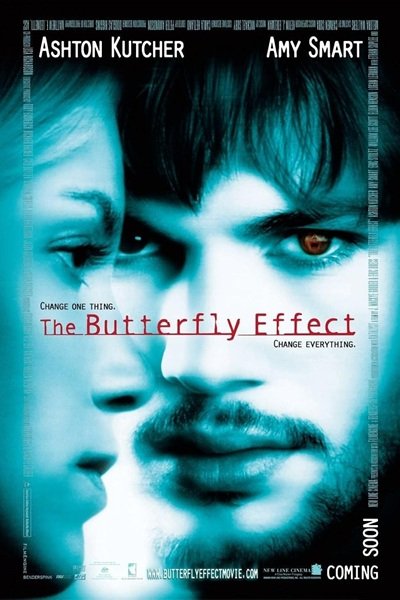
Sometimes, it's time for all of us to review our actions and, from there, understand how far these decisions were able to take us. This makes us think about a very popular utopia: the chance to go back in time. Many people believe that if they were able to do this, they would have a better life than the one they have today. However, would this really work? Once we make any changes to what has already happened, there is a strong probability that the “new future” will “irreversibly collapse”.
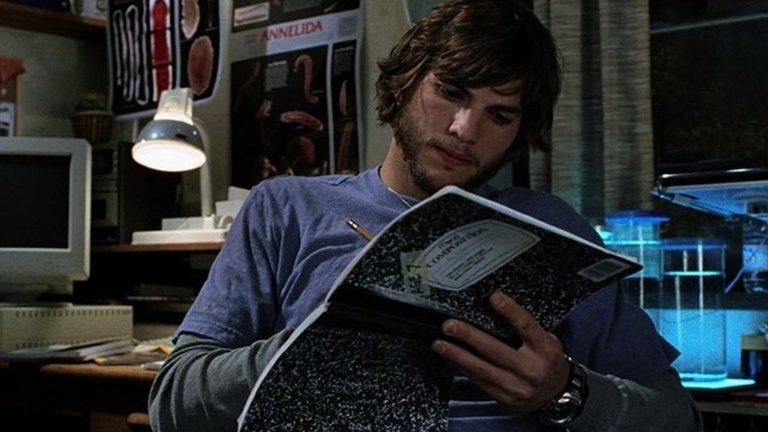
In the plot of The Butterfly Effect (which was released in 2004), this is exactly what happens. When a young man named Evan decides to venture into a regression process to forget traumatic memories from his troubled past, he not only goes back in time from a perspective that involves years, but also involves a physical change (since he does this regression by returning to his child's body). This is considered an “orthodox” step back in time, and it brings even greater challenges for a young person who will start to fight to do everything differently.
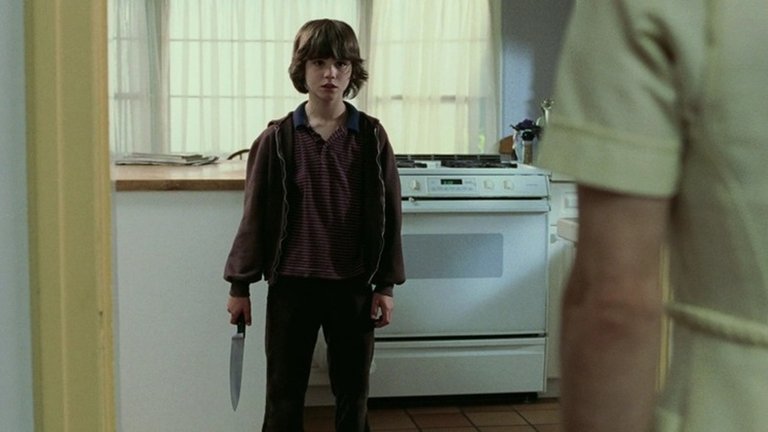
The interesting and provocative script for this movie (written by J. Mackye Gruber and Eric Bress) was based on the well-known theory of the “butterfly effect,” which is explained through a concept in which the chaos caused by changes made by any type of action can bring totally unexpected consequences, thus altering an entire universal system that has its own rules. The way this movie works with this idea was something that brought a certain novelty to cinema, and dared to “play” with different types of ideas and fostered good debates.
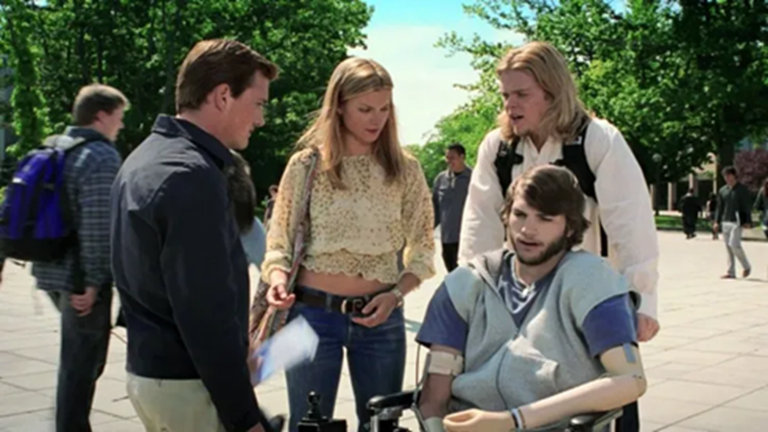
Ashton Kutcher brings to life a complex character and as he tries to undo all his mistakes, everything is converted into new problems that will affect his life in the future. The narrative follows a well-defined line of argument, and even though the entire cast is not that good (with the exception of Kutcher himself and Amy Smart, who, by the way, have very good chemistry on screen and for this reason their good performance is praised), they manage to “pave” the path along which the plot is built. The best part of all is seeing how “time travel” happens in this script.
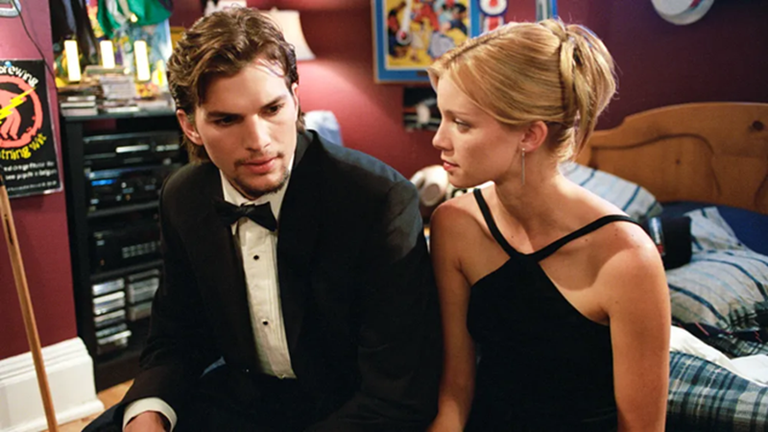
Don't expect escapist resolutions here, because the directing duo (who are the same duo who wrote the script) were skillful in delivering bold alternatives to the audience (thus avoiding the use of clichés). A work with above-average efficiency for this type of project, which in the early 2000s was still an "unexplored" territory. Technically, this project also deserves recognition, because despite being somewhat simple, it is creative and quite innovative within the scope of science fiction, mainly due to its highly dramatic and heartbreaking conclusion.
This post is my entry for the CineTV Contest #132, which is being promoted by the CineTV community.
A veces ha llegado el momento en que todos debemos revisar nuestras acciones y, a partir de ahí, comprender hasta dónde nos pudieron llevar esas decisiones. Esto nos hace pensar en una utopía muy popular: la posibilidad de retroceder en el tiempo. Muchas personas creen que al poder hacer esto, tendrían una vida mejor que la que tienen hoy. Sin embargo, ¿sería esto realmente funcional? Una vez que hagamos algún cambio en lo que ya sucedió, existe una gran probabilidad de que el “nuevo futuro” entre en un “colapso irreversible”.
En la trama de El efecto mariposa (que se estrenó en 2004), esto es exactamente lo que sucede. Cuando un joven llamado Evan decide aventurarse en un proceso de regresión para olvidar los recuerdos traumáticos de su turbulento pasado, no sólo retrocede en el tiempo desde una perspectiva que implica años, sino que también implica un cambio físico (ya que realiza esta regresión regresando a su cuerpo de niño). Esto se considera un paso atrás en el tiempo “ortodoxo”, lo que trae desafíos aún mayores para un joven que comenzará a luchar por hacer todo de manera diferente.
El interesante y provocativo guión de esta película (que fue escrito por J. Mackye Gruber y Eric Bress) encontró su base en la conocida teoría del “efecto mariposa”, la cual se explica a través de un concepto donde el caos promovido por cambios llevados a cabo por cualquier tipo de acciones puede traer consecuencias totalmente inesperadas, alterando así todo un sistema universal que tiene sus propias reglas. La forma en que esta película trabaja con esta idea fue algo que aportó cierta originalidad al cine, se atrevió a “jugar” con diferentes tipos de ideas y fomentó buenos debates.
Ashton Kutcher da vida a un personaje complejo y mientras intenta deshacer todos sus errores, todo se convierte en nuevos problemas que afectarán su vida en el futuro. La narrativa sigue una línea argumental bien definida, y si bien el reparto en su conjunto no es tan bueno (a excepción del propio Kutcher y Amy Smart, quien, por cierto, tiene muy buena química en pantalla y por eso elogia su buena actuación), logran “allanar” el camino sobre el que se construye la trama. Lo mejor de todo es ver cómo sucede el “viaje en el tiempo” en este guión.
No esperéis aquí resoluciones escapistas, porque el dúo de directores (que es el mismo dúo que escribió el guión) fue hábil a la hora de ofrecer alternativas audaces al público (evitando así el uso de clichés). Trabajar con una eficiencia superior a la media para este tipo de proyectos, que a principios de los años 2000 todavía eran territorio “inexplorado”. Técnicamente, este proyecto también merece reconocimiento, pues a pesar de ser algo simple, es creativo y bastante innovador dentro del ámbito de la ciencia ficción, principalmente por su conclusión altamente dramática y desgarradora.
Esta publicación es mi entrada para el Concurso CineTV #132, que está siendo promovido por la comunidad CineTV.
Em alguns momentos, é chegada a hora em que todos nós precisamos rever os nossos atos e a partir daí, entender até onde essas decisões foram capazes de nos levar. Isso nos faz pensar sobre uma utopia que é muito popular: a chance de poder voltar no tempo. Muitas pessoas acreditam que sendo capazes de fazer isso, elas teriam uma vida melhor do que à vida que elas têm hoje. No entanto, será que isso realmente seria algo funcional? Uma vez que fazemos qualquer mudança sobre o que já aconteceu, há uma forte probabilidade de que o “novo futuro” entre em “colapso irreversível”.
Na trama de Efeito Borborleta (que foi lançado no ano de 2004), é exatamente isso o que acontece. Quando um jovem chamado Evan decide se aventurar dentro de um processo de regressão para esquecer memórias traumáticas do seu passado conturbado, ele não apenas volta no tempo sob uma ótica que envolve os anos, mas sim, que também envolve uma mudança física (já que ele faz essa regressão voltando ao seu corpo de criança). Essa é considerada uma volta no tempo “ortodoxa”, e que traz desafios ainda maiores para um jovem que vai começar a lutar para fazer tudo diferente.
O interessante e provocativo roteiro deste filme (que foi escrito por J. Mackye Gruber e Eric Bress) encontrou à própria base na conhecida teoria do “efeito borboleta”, que é explicada através de um conceito onde o caos promovido pelas mudanças realizadas por quaisquer tipos de ações pode trazer consequências totalmente inesperadas, alterando assim todo um sistema universal que tem o seu regimento próprio. O modo como esse filme trabalha essa ideia foi algo que trouxe um certo ineditismo para o cinema, e ousou “brincar” com diferentes tipos de ideias e fomentou bons debates.
Ashton Kutcher dá vida a um personagem complexo e à medida em que ele tenta desfazer todos os seus erros, tudo é convertido em novos problemas que irão afetar à vida dele no futuro. A narrativa segue uma linha argumentativa bem delineada, e mesmo que o elenco por inteiro não seja tão bom (com exceção do próprio Kutcher e da Amy Smart, que aliás, tem uma química muito boa na tela e por isso enaltece a boa performance deles), eles conseguem “pavimentar” o caminho pelo qual a trama é construída. O melhor de tudo é ver como a “viagem no tempo” acontece nesse roteiro.
Não espere por resoluções escapistas aqui, porque a dupla de diretores (que é a mesma dupla que escreveu o roteiro) foi habilidosa ao entregar alternativas ousadas para o público (evitando assim a utilização de clichês). Um trabalho com eficiência acima da média para esse tipo de projeto, que no início dos anos 2000 ainda era um território “inexplorado”. Tecnicamente, esse projeto também merece reconhecimento, porque apesar de ser algo simples, é criativo e bastante inovador dentro do escopo da ficção científica, principalmente pela sua conclusão altamente dramática e dilacerante.
Este post é a minha participação para o Concurso CineTV #132, que está sendo promovido pela comunidade CineTV.
Posted Using INLEO
Obrigado por promover a comunidade Hive-BR em suas postagens.
Vamos seguir fortalecendo a Hive
For many years I have been fascinated by the idea of time travel, and there are a ton of movies and series about this.
If you mix in the idea of parallel earths (multiverse), then you basically end up with a theory where corrections in the past doesn't affect the future of the world you come from, as the correction never happened in the life you lived. Hence, creating a new timeliness where the "new world" would play out.
Nonetheless, The Butterfly Effect is a great movie! It really pushed some boundaries back in the days 💯
!BBH !hiqvote
This kind of idea is fascinating for any movie script. The possibilities for approaches are endless.
This movie really is excellent, great choice, and great review!
!PIZZA
It's a very good one.
$PIZZA slices delivered:
@dadapizza(1/5) tipped @wiseagent
Moon is coming
Ohhhh
Not when I thought the going back in time would set out everything perfectly for him only to meet new devils to fight. I watched a similar movie which is seventeen again but the man actually set right the wrong he went to right. We should just learn from the mistakes of the past and have a better tomorrow
Someway, somehow... Movies like these make us reflect on our mistakes, and what our next steps will be to become better people.
Without a doubt, this is one of my favorite time travel movies because of how raw, realistic, and profound its story is. The way it encompasses so many possibilities of alternate realities or futures that vary depending on the decisions or actions the protagonist makes in the past is surprising. But what fascinates me most is the unforgettable ending.
Good review.
I really like this movie, and damn... That ending is heart-breaking!
Change one thing and alter everything because really we can't play God. I doubt there's ever a movie with time that altering the past did not ruin everything. The trailer seemed great and I have added to my watch list 🙂
Yeah. You can't change the past without changing the future... That's the "law", haha!
Tough luck 😂
Ashton is one of my favorite actors.
I have watched The Butterfly Effect a few times. It's definitely a good film.
Your review will attract many who didn't watch it yet.
Thanks!
This movie is a real good one. Still somewhat "unknown" for many people out there, and in need of more recognition.